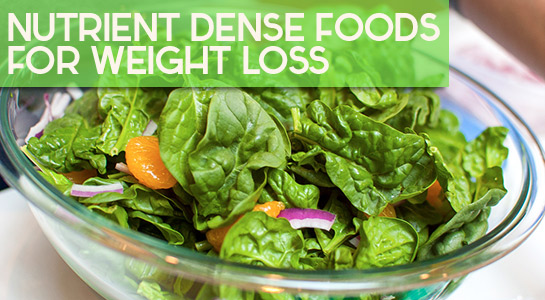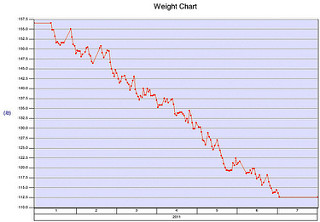Why Nutrient-Dense Foods Might be the Secret to a Successful Weight Loss Diet
Want to lose weight without starving yourself? Want to be able to eat as much as you want without getting fat? Tired of trying to stick to strict diets that leave no room for movement and have you constantly starving and pining after tastier snacks? Perhaps you're coming at this from the wrong angle?/p>
Maybe instead of trying to force yourself to eat less than you feel like you want, the answer is instead to want less. Let's take a look at how you can accomplish that.
The Problem With Calorie Counting

Conventional wisdom says that the best way to lose weight is to restrict your calories, such that you are consuming fewer calories than you are 'burning' during the day. In theory, you accomplish this by counting/calculating all the calories coming into your body on a regular basis and then calculating how many you're burning through your physical activity (and through your regular bodily functions and metabolic activity).
By doing the math, you should then be able to make sure that what's going out exceeds what's coming in and as a result your body will be forced to burn fat stores. Does this work? Yes, definitely, but there's a lot wrong with simply counting calories.
For starters, if you simply count calories so that you are eating less than you're burning off, you're going to be in a constant state of hunger, which isn't particularly enjoyable and not easy to maintain. Furthermore, counting calories is in itself a miserable activity, taking a lot of the enjoyment out of eating.
Moreover, it's actually impossible to accurately calculate the precise number of calories going in or out of your body. While you can get estimates for how many calories there are in an apple for example, the reality is that different apples are different sizes and will contain more or fewer calories as a result. And this is just the tip of the iceberg: while you can 'roughly' calculate your 'BMR' or 'Basal Metabolic Rate' (the amount of calories you burn when you're not doing anything), the reality is that this will vary significantly from day to day and will never be accurate. And who is accounting for the number of calories burned when you climb a flight of stairs? Or when it gets cold and your body burns energy through shivering? The point is that your estimates for the calories you're taking in and burning can never be particularly accurate, meaning you'll have to 'err on the side of caution' ?i.e. maintain a big deficit for it to work.
Most crucially of all though, dieting by restricting calories alone will often lead to people losing weight at the expense of their health ?as they end up restricting their calories with no thought as to whether or not they're getting the right nutrients or not.
Alternatives: Nutrient Dense Foods
Also relevant here is the fact that different calories react in the body differently depending on where they come from. Eating lots of protein for instance is unlikely to lead to much fat gain, as protein is more often stored as muscle and actually requires energy simply to digest.
This has been covered on multiple other occasions, but there are many better ways to diet that don't involve counting calories. Things like the slow carb diet for instance automatically reduce the number of calories you eat, while also reducing the insulin spikes that come from consuming 'simple' carbs like white bread and cake.
Another strategy though, is to simply aim to eat foods that are more dense in nutrients. Nutrient dense foods are those that contain large amounts of micronutrients such as minerals, vitamins, amino acids and more. These are the opposite of 'empty' calories ?which just so happen to also often be those highly processed 'fast carbs' that we're so often told to avoid.
Eat nutrient dense foods and you'll give your body more of what it needs with every meal. The result of this is that you'll be healthier; think stronger bones, better skin, more energy and generally greater 'well-being' all around. At the same time though, eating nutrient dense foods will also help you to feel fuller. Many cravings are actually result of our body running low on certain nutrient and then telling us to eat in order to try and get them ?problem is that we often misinterpret this communication and end up eating the wrong stuff. If you eat nutrient dense meals, you'll get fuller from each meal that you eat and you won't crave other foods so quickly. The result will be that you find it much easier to stick to a low calorie diet than you otherwise might and that you can eat as much as you want... because you won't want much.
Finding Nutrient Dense Foods
So now you know you should be eating nutrient dense foods, the next question is: what are nutrient dense foods? And where can you find them?
For the sake of simplicity, we are going to define nutrient dense foods as those that contain large amounts of vitamins, minerals, amino acids, antioxidants and enzymes compared to the number of calories. These are the opposite of 'empty calories'.
Anything that is described often as a 'superfood' then, is going to make this list and be considered very much one of our nutrient dense foods. A good example is spinach, which is often referred to as the 'first superfood' thanks to its high content of iron, phytoecdysteroids, calcium and other nutrients. Eat a plate full of spinach and you will likely feel full, despite not having eaten that many calories.
Meat is also nutrient dense containing a lot of amino acids (protein) and lots of minerals. The calories mostly come from the fat, but with lean meat you won't get that much. As with spinach, it's very difficult to 'over-eat' if you stick to meat.
The same is also true of most vegetables in fact: things like carrots, broccoli, cauliflower, sweet potatoes?they're all high in various nutrients and low in calories making them a great way to fill yourself up.
While fruits are very high in nutrients, they're also actually quite high in calories. While you should make sure to get some fruits in your diet for varieties sake, you shouldn't rely on them to fight hunger: vegetables are preferable if you're trying to fight the flab.
Conclusion
In conclusion then, if you eat a diet high in nutrient rich foods, you'll find that by extension, you end up eating fewer calories, feeling less hungry and actually improving your health as well ?and you don't have to starve yourself in order to get there.
The catch? You need to start cooking again. That means cooking things like hot pots, like pork chop with steamed vegetables, like fish pie?foods that actually contain real ingredients rather than things you can just stick in the microwave or oven. The way that momma used to do it in fact. It's a little more work yes, but you'll feel better than you have done for a long time.
-
How To Get Over A Weight Loss Plateau
Everyone who has ever tried to lose weight has hit a plateau at some p
-
Influenza (flu) vs. strep throat, differences in symptoms, causes, and treatment
Influenza (flu) and strep throat may seem like one and the same
-
Trim The Gas Budget And Your Waistline
In the aftermath of Hurricane Katrina, gasoline prices appear to be on
-
Bontril Diet Pill: A Key to Achieve and Maintain a Healthy Weight!
The percentage of overweight and obese p
-
How Do You Learn to Enjoy All Foods Without Overeating? Practice, Practice, Practice.
Marci called Thursday morning. “Can I bring a fear food tonig
-
HCG drops vs . HCG shots
HCG injections typically are not inevitably preferred over Convenient
- DON'T MISS
- The Dieters Miracle Diet
- Good Nutrition Can Lead to Desired Weight Loss
- Run Your Car On Water And Save Big On Gas Every Month
- Weight Management Secrets That My Mother Never Told Me
- Weight Loss Help You Can Use Every Day
- How Drinking Pure Coconut Water Can Help You Shed Pounds
- Your Ultimate Guide to Alleviating Anxiety and Losing Weight With Tea!
- Are you SAD about Winter Weight Gain?
- Why Is Belly Fat So Bad?
- The Truth About Red Meat




